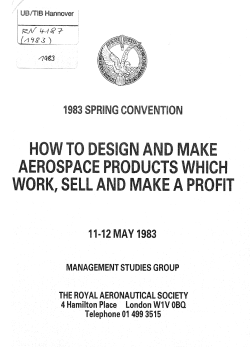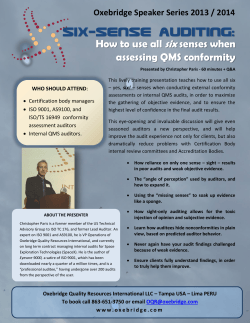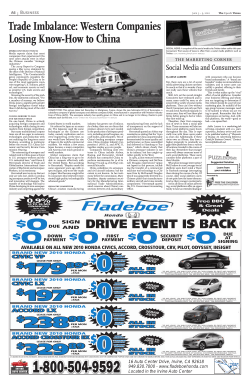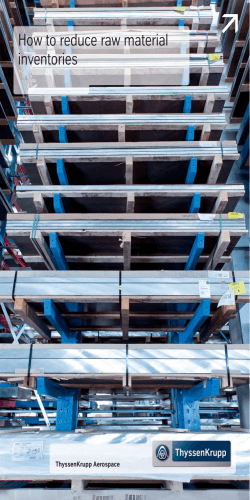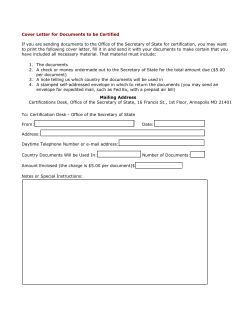
AS9100C: How to Effectively Interpret the Evolving Quality Management Requirements in
AS9100C: How to Effectively Interpret the Evolving Quality Management Requirements in the Aerospace Industry A Guide to Making the Right Choices for an Efficient and Profitable Transition TUV Rheinland of North America www.tuv.com/us Executive Summary For the aerospace industry and its suppliers, AS9100 Revision C (Quality Management Systems Requirements for Aviation, Space, and Defense Organizations) represents important and imminent choices. The first, and perhaps most difficult, is to summon the commitment needed to take action. Once this occurs, the auditing and certification process can proceed with less time, expense and trouble than many organizations anticipate. This informative whitepaper will help organizations prepare for a smooth transition to AS9100 Rev C through the auditing and certification process. The bottom line: Companies should not allow the confusion surrounding the latest revisions of the AS9100 series of standards to cause delays in the transition of their certifications or recertifications. Waiting will only result in higher costs and could ultimately affect customer perceptions of quality. Why Has AS9100C Created So Much Confusion? The aerospace equivalent of ISO 9001 is actually a family of standards: AS9100C, AS9110 and AS9120. They are the newest set of specifications used to verify and measure the quality processes of suppliers and original equipment manufacturers. The confusion around the 2009 revisions of the AS9100 series of standards occurred for a variety of reasons. Changes in requirements are challenging and require a deliberative, consensus-based approach. One of the results of this process is delay. The inevitable delays, in turn, have left many organizations wondering exactly what they should do and when. Fortunately, at this point the path is becoming clearer. Now it’s time for vendors and OEMs to step up to the plate. Delays will at minimum add cost and time. In the worst case, inaction can cause a company’s certificate to be canceled in July, 2012. What Is Changing with AS9100C From a high-level perspective, the objectives of Rev C are to increase the emphasis on product and process improvement, including project management, risk management and other important aspects of aviation and defense/space. There is also increased focus on timely and quality deliveries. In addition, more efforts were made to ensure that AS9100 is a better fit for all organizations regardless of size. While the changes from AS9100B to AS9100C are in many ways extensive, it’s important to note there is good news: Many add clarity to the requirements. However, the purpose of this whitepaper is not to explain all the changes, but rather to address the underlying confusion around how and when companies should transition to the new version of the standard. Why Seek Certification – or Recertification? With the delays and confusion around the release and implementation of AS9100C, some organizations are asking a basic question: Do we really have to devote time and resources to become certified or recertified under the new standard? The answer: a definite yes. Registration proves beyond a doubt that companies: • Are committed to quality and efficiency AS9100C: How to Effectively Interpret the Evolving Quality Management Requirements in the Aerospace Industry www.tuv.com/us 2 • Have in place the standards, people and procedures – an effective quality management system – satisfying demanding external standards • Are deeply concerned about safety and reliability of their aviation, space and defense products. Certification to the AS9100 series of standards improves a company’s standing in the eyes of customers, employees and shareholders. It’s more than an image enhancement – it’s proof of commitment. It also provides an edge in marketing. All of this can have a direct impact on sales, revenues and the bottom line. The first decision With regard to what to do about AS9100C, there are two initial choices: • Certify (or recertify) to the old standard and then eventually upgrade • Proceed directly to the new standard Either way, the key is to decide quickly and begin planning. Two important dates to keep in mind • Companies must be in compliance with AC9100C by July 1, 2012 • Any audit done after July 1, 2011 has to be done to the new standard Companies not yet registered to AS9100 should consider proceeding directly to Revision C if possible. This will save the additional audit cost of upgrading. An upgrade audit will be of longer duration than a typical surveillance or recertification, and by proceeding directly to Revision C, companies don’t have to shoulder the additional costs. In some cases, however, recertifying to the old standard may be a good idea. This can be a way to get the company in shape for AS9100C. If necessary, this might be the time to call in a consultant to help hasten the process. As a certifying body, TUV Rheinland does not offer consulting services. TUV Rheinland does partner with a number of consultants, and can provide information on whom to contact for those organizations wishing for specialized help. AS9100C timeline – 30 Month Transition Schedule AS9100C: How to Effectively Interpret the Evolving Quality Management Requirements in the Aerospace Industry www.tuv.com/us 3 How to Make a Smooth Transition to AS9100C Organizations will have to be certified under AS9100C at some point. Once that decision is made, the steps are clear: 1. Identify the requirements of AS9100C. For more on that, visit http://standards.sae.org/as9100c/ 2. Perform a Gap analysis to determine how Rev C applies to your business 3. Establish quality objectives 4. Compile and prioritize requirements 5. Publish the requirements as a quality policy, with guidelines on implementation 6. Ensure that they are communicated throughout the company 7. Perform internal audits to ensure the policies have been adopted and are performing as expected Once you believe your organization meets all the requirements of AS9100C, it’s time for an external audit. This should be carried out by a third-party accredited certification body. TUV Rheinland is one such organization that is fully accredited to conduct audits against AS9100C. Whatever auditing company you choose, make sure it has been accredited to audit against the 2009 series of AS9100 standards, AS9110, AS9120 and AS9100. Registrars are required to be re-approved by the accreditation bodies in order to be authorized to perform these audits, and must use auditors who have been through Aerospace Auditor Transition Training (referred to as the AATT), officially sanctioned by the IAQG. Once the audit begins, your auditing company will review your quality manuals and procedures. The on-site audit will ensure that working practices follow the procedures and stated objectives and that appropriate records are kept. After a successful audit, a certificate of registration to AS9100C will be issued. This will be followed by subsequent visits (usually once or twice a year) to ensure that the system continues to work. Also, your company’s record in OASIS will be updated to reflect registration to the new standard. Conclusion: The Time to Act is Now Start reviewing the new standards. You’ll need to identify all requirements affecting your company and start planning to remediate any gaps. It’s also important to quickly let your auditor know your intentions regarding an upgrade to AS9100C. If you don’t have a specific auditing organization in mind, start your due diligence immediately. AS9100C: How to Effectively Interpret the Evolving Quality Management Requirements in the Aerospace Industry www.tuv.com/us 4 About TUV Rheinland North America In August 2010, TUV Rheinland of North America became one of the first organizations to win approval to provide certification to AS9100C. Its primary aerospace auditors have successfully completed the AATT (Aerospace Auditor Transition Training). TUV Rheinland is the global leader in Management Systems Certification. It became the fastest growing certification and testing company in the world by providing customers with exceptional service and global access. Through our extensive global network, flexible scheduling, rapid turn-around times and extensive portfolio of services, we offer the most cost-effective and time-efficient certification, providing organizations with immediate competitive advantages both domestically and globally. For more information on TUV Rheinland Management Systems Certification, please call us toll-free at 1-TUV-RHEINLAND (1-888-743-4652) or visit www.tuv.com/us to start a project. AS9100C: How to Effectively Interpret the Evolving Quality Management Requirements in the Aerospace Industry www.tuv.com/us 5
© Copyright 2026

